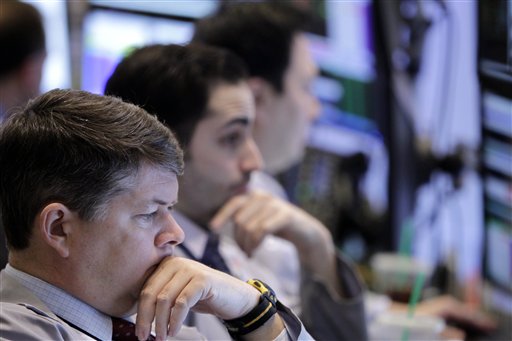NEW YORK — It came and went in a flash, a number on a board for seconds at a time, but its symbolic power couldn’t be dismissed.
The Dow Jones industrial average, powered higher all year by optimism that the economic recovery is finally for real, crossed 13,000 today for the first time since May 2008.
The last time the Dow occupied such rarefied territory, unemployment was a healthy 5.4 percent, and Lehman Brothers was a solvent investment bank. Financial crises happened in other countries, or the history books.
The milestone today came about two hours into the trading day. The Dow was above 13,000 for about 30 seconds, and for slightly longer at about noon and 1:30 p.m., but couldn’t hold its gains. It finished up 15.82 points at 12,965.69.
Still, Wall Street took note of the marker.
It was just last summer that the Dow unburdened itself of 2,000 points in three terrifying weeks. S&P downgraded the United States credit rating, Washington was fighting over the federal borrowing limit, and the European debt crisis was raging.
A second recession in the United States was a real fear. But the economy grew faster every quarter last year, and gains in the job market have been impressive, including 243,000 jobs added in January alone.
“Essentially over the last couple of months you’ve taken the two biggest fears off the table, that Europe is going to melt down and that we’re going to have another recession here,” said Scott Brown, chief economist for Raymond James.
The tumult of last summer and fall left the Dow as low as 10,655. Its close today put it 22 percent above that low. The Dow is less than 1,200 points from an all-time high, a 9 percent rally from here.
A long-awaited deal to cut the debt of Greece and prevent a potentially catastrophic default on its debt, announced before dawn in Europe after 12 hours of talks, helped the Dow clear 13,000.
Under the bailout deal, Greece will get euro130 billion, or about $172 billion, from other European nations and the International Monetary Fund. In a separate deal, it will owe euro107 billion less to investors who own its government bonds.
After months in which the talks crawled along and vague headlines yanked the market up and down, the conclusion was almost anticlimactic because the markets were already expecting an agreement.
European markets didn’t take the news as well. Stocks closed down 3.5 percent in Greece, where stocks have lost 80 percent of their value since 2007. Stocks declined less than 1 percent today in Germany, France and Britain.
Investors noted that Greece remains in deep recession. Its bond investors will take a 53.5 percent loss on the face value of their bonds, which could discourage future investment.
In the U.S., investors were cheered by earnings from Home Depot, watched closely as a barometer of American spending on homes, and Macy’s. Wal-Mart missed Wall Street expectations, and its stock lost 4.2 percent, worst among the 30 stocks in the Dow.
The Dow has climbed 6 percent this year and has not lost 100 points on any day. The Greek debt crisis may be receding, but high gasoline prices are emerging as a threat to the economic recovery, and thus the stock market.
A gallon of regular gas costs $3.57 on average, the highest on record for this time of year. With tension building over Iran’s nuclear ambitions, Iran has halted oil exports to Britain and France and threatened to stop shipping to other European countries.
The price of oil settled at $106.25, up $2.65 for the day and its highest level since last May. Airline stocks got clobbered. United Continental lost 9 percent, Delta Air Lines 7 percent. The Dow transportation average lost 1.5 percent.
Materials, telecommunications and energy companies led the industries gaining ground. Health care companies, makers of consumer staples and utilities, traditionally stocks to own in more cautious times, were lower.
Send questions/comments to the editors.



Success. Please wait for the page to reload. If the page does not reload within 5 seconds, please refresh the page.
Enter your email and password to access comments.
Hi, to comment on stories you must . This profile is in addition to your subscription and website login.
Already have a commenting profile? .
Invalid username/password.
Please check your email to confirm and complete your registration.
Only subscribers are eligible to post comments. Please subscribe or login first for digital access. Here’s why.
Use the form below to reset your password. When you've submitted your account email, we will send an email with a reset code.